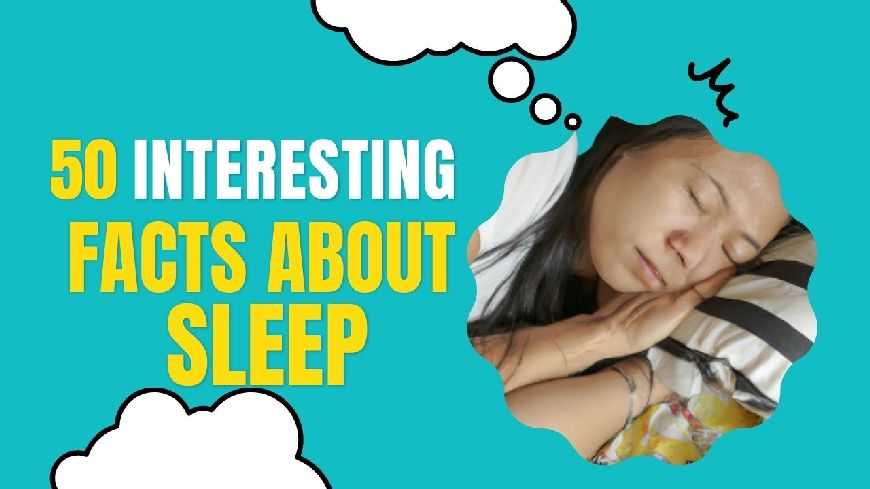Sleep is a fundamental aspect of human life that affects many aspects of our health and well-being. Here are 50 facts about sleep:
- Sleep cleanses your brain.
- Talking in your sleep is known as somniloquy.
- Light affects your sleeping habits.
- The fear of sleep is called somniphobia.

- The sudden feeling of falling while you sleep is called a myoclonic jerk.
- A snail can sleep for three years.
- The University of Chicago conducted the first ever sleep study.
- In Japan, napping at work is honorable.
- The record for the longest period without sleep is 11 days.
- A giraffe only needs 1.9 hours of sleep a day.
- A new baby typically results in 400-750 hours lost sleep for parents in the first year alone.
- The average person will spend around 26 years of their life sleeping.
- Dreams are more commonly negative than positive.
- The longest recorded period without sleep is 18 days, 21 hours, and 40 minutes.
- Snoring occurs when air cannot move freely through your nose and mouth during sleep.
- People who suffer from insomnia have a higher risk of developing depression.
- Sleep deprivation can lead to weight gain.
- The amount of sleep needed varies depending on age.
- Sleep deprivation can lead to memory loss.
- Sleeping pills can be addictive.
- Sleepwalking occurs during deep sleep.
- Sleep apnea can be life-threatening.
- Sleeping on your stomach can cause neck pain.
- Sleeping on your back can cause snoring.
- Sleeping on your side can help reduce snoring.
- Drinking alcohol before bed can disrupt your sleep cycle.
- Caffeine can stay in your system for up to six hours after consumption and disrupt your sleep cycle.
- Exercise can help improve the quality of your sleep.
- Taking a warm bath before bed can help you fall asleep faster.
- Reading before bed can help you relax and fall asleep faster.
- Eating a heavy meal before bed can disrupt your sleep cycle.
- Taking naps during the day can help improve productivity and alertness.
- Sleeping in a cool room can help improve the quality of your sleep.
- Sleeping with pets can disrupt your sleep cycle.
- Sleeping with a partner can help improve the quality of your sleep.
- The average person will spend around six months of their life waiting for red lights to turn green while driving at night due to melatonin production being disrupted by headlights.
- People who work night shifts have an increased risk of developing heart disease and diabetes.
- People who work night shifts have an increased risk of developing depression and anxiety disorders.
- People who work night shifts have an increased risk of developing gastrointestinal problems such as ulcers and irritable bowel syndrome (IBS).
- People who work night shifts have an increased risk of developing breast cancer and prostate cancer.
- People who work night shifts have an increased risk of developing obesity and metabolic syndrome.
- People who work night shifts have an increased risk of developing reproductive problems such as infertility and miscarriage.
- People who work night shifts have an increased risk of developing cardiovascular disease.
- People who work night shifts have an increased risk of developing respiratory problems such as asthma.
- People who work night shifts have an increased risk of developing neurological problems such as Alzheimer’s disease.
- People who work night shifts have an increased risk of developing diabetes.
- People who work night shifts have an increased risk of developing respiratory problems such as asthma.
- People who work night shifts have an increased risk of developing neurological problems such as Alzheimer’s disease.
- People who work night shifts have an increased risk of developing cancer.
- People who work night shifts have an increased risk of developing diabetes.
- People who work night shifts have an increased risk of developing depression.
- People who work night shifts have an increased risk of developing anxiety disorders.
- People who work night shifts have an increased risk of developing gastrointestinal problems such as ulcers and irritable bowel syndrome.
- People who work night shifts have an increased risk of developing reproductive problems such as infertility and miscarriage.
From the benefits of daytime sleep at work in Japan to the dangers of working the night shift, there are many interesting facts and studies related to sleep. Sleep has been found to clear the brain, reduce the risk of depression, improve memory, and help control weight. Sleep deprivation can lead to negative outcomes such as memory loss, weight gain, and even life-threatening conditions such as sleep apnea. The amount of sleep you need depends on your age, and factors such as light, diet, and exercise can affect sleep quality.








